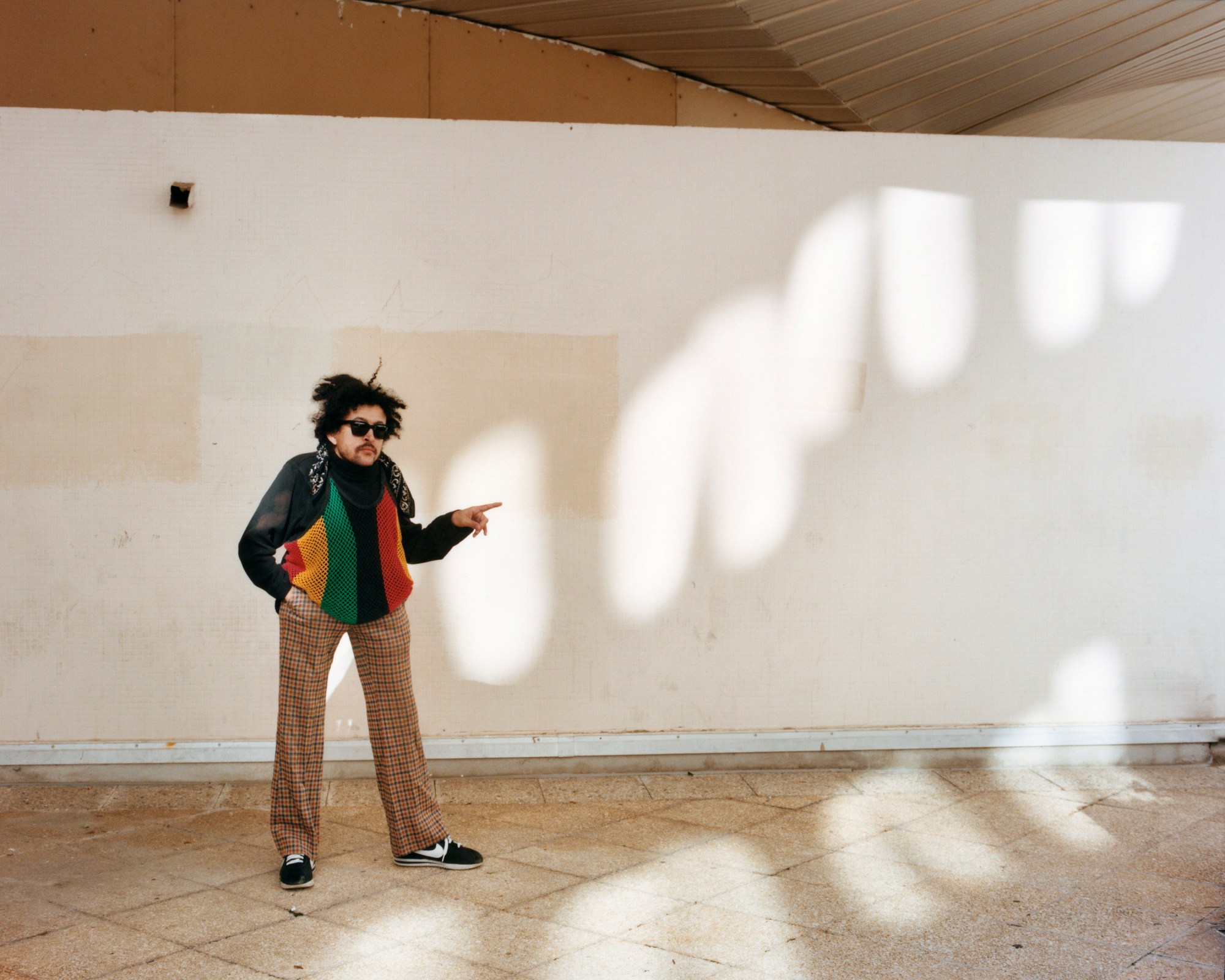Disco’s new hope goes by the name of Cola Boyy, and he’s sitting across the table from us at a breakfast spot in Shoreditch. It’s 9am — the morning after he supported electro-pop heavyweights MGMT at their Somerset House show — and he’s feeling a little worse for wear. He and the band went out after the gig, drinking at the profoundly posh Chiltern Firehouse, and we’re laughing now at his first encounter of the London spot’s pretentious no-photo policy. It might’ve been suave, speakeasy cocktails last night, but this morning it’s orange juice, bacon and pancakes — maple syrup on the side.
The 28-year-old musician, real name Matthew Arango, is far from home, but his American upbringing has followed him to the breakfast table. Raised in the Californian city of Oxnard, he grew up in a community that harboured plenty of happy memories for him, surrounded by likeminded people. “It was all I ever knew really,” he says of his childhood in a city that’s spawned musical geniuses like Anderson.Paak in the past. “My friends and my family are all from there. It’s 80% Latino, so everybody’s brown, and then you go to other places in the world you soon realise it’s never the same.”
Fizzing and upbeat, the music of Cola Boyy feels inclusive and universal; like it was designed in-vitro for the dance floor. Imagine Bee Gees-slash-Studio 54 bops reupholstered for the next generation of the 70s disco legends, and you might have a good idea of what this guy sounds like. Nowadays though, we like our dance music darker — the lovelorn work of Lorde and Robyn proved that — and so songs like his latest Penny Girl take the sonic hallmarks of finger-clicking glitterball disco and pair them with starker lyrics. “I was trying to make disco without knowing what the fuck I was doing!” he laughs, telling us about how the song came to life. “Whenever I write, I’m asking myself, ‘How can I make the catchiest fucking song?’ That’s all I want to do, and this was the first one I wrote that really felt like real disco!”
Sure, it might sound like it, but if you look deeper into the lyrics, it’s a (non-autobiographical, thank fuck!) song about a man who murders his object of affection’s current boyfriend in order to be with her. Kind of tragic. We were all just too busy dancing to notice.
It makes for a chilling allegory to the state of modern day America, as so many turn a blind eye to the Trump administration’s crippling effect on the country’s marginalised communities. Matthew is part of the generation who has lived through pop’s politicisation. His experiences, as a person of colour living with a disability in Trump’s America — he has spina bifida — has obviously altered his view of the world and the music industry to boot. “There’s no way it couldn’t,” he admits. “If I said it didn’t, I would be lying to myself. All of our experiences are part of what make us what we are. I always knew I was getting stared at and made fun of by strangers everyday — you get used to that type of treatment. To me, I expected it to happen in the music world.”
When he first burst on to the scene, having established a connection with MGMT, conspiracy theories arose that suggested Matthew was merely a front for the latest side-project by the band. It was funny to him at first, but after a while, the depressing reality of people perceiving him as a puppet, incapable of creating his own art, set in. Thankfully, the whole experience has given him a thicker skin. He’s as much an activist now as he is a musician.
When Matthew’s not making music, he’s part of Oxnard’s far-left Todo Poder Al Pueblo collective, who support the rights of the city’s immigrants and highlight their issues with the pressing issue of police brutality too. He’s also a staunch anarchist, and prides himself on being part of the city’s punk history as a teen — even if what they did back then “tended to be all talk and no action”. It’s no surprise that his disdain for capitalism is clear; he loathes the fact that his stage last night was plastered with American Express logos! Like a proper rockstar, he made sure to denounce them halfway through his set.

Matthew knows he has to talk about Oxnard’s darker side, since it’s one that most seem too scared to address. “People struggle there, but in any part of the world you’re going to find people who are resisting something,” he says. “Oxnard? There’s a lot of exploitation there.” He tells us about the city’s world-famous strawberry fields; something that attracts tourists with a celebratory annual festival, lured in by an idealist vision of white-picket fence America. “But it’s built off the exploitation of immigrants working in the fields for nothing,” he says, “doing backbreaking work every day for 12 hours. It’s awful and people don’t want to take it.”
Disco has always been a genre rooted in positivity and celebration, of letting loose and enjoying ourselves in the moment. But what are the implications of creating carefree beats in America now? Does Cola Boyy see himself as the front of a disco-led political movement?
“None of my songs are necessarily political — I mean they are, in the sense that I wrote them — but the way I look at the world is through a lens of my own experiences,” he says. “I’m not a fan of people doing political songs for the sake of doing them, particularly nowadays. The work I do at home, with the groups that I’m part of? That’s what matters to me. They know what struggle is.”
Matthew seems disgruntled by the idea of political slacktivism in music becoming an easy talking point for artists who aren’t willing to step out onto the front line and actually do something. Cola Boyy, American disco’s true political trailblazer, has his own approach: “I’m not going to change the world with my words, I’m going to change the world with my actions,” he says, without a glimmer of disingenuousness — just a cheeky grin: “With my fist — punching a Nazi!”
Cola Boyy’s debut EP, Black Boogie Neon, is due 21 September

